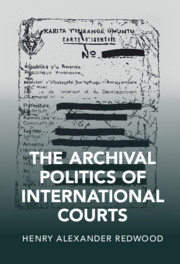Book contents
- The Archival Politics of International Courts
- Cambridge Studies in Law and Society
- The Archival Politics of International Courts
- Copyright page
- Contents
- Acknowledgements
- Abbreviations
- Chapter One The Politics of Archival Knowledge in International Courts
- Chapter Two The International Criminal Tribunal for Rwanda and Its Archive
- Chapter Three The Force of Law
- Chapter Four Contesting the Archive
- Chapter five Reconstituting Justice
- Chapter Six Imagining Community
- Chapter Seven The Residual Mechanism and the Archive
- Conclusion: The ICTR’s Archive
- Bibliography
- Index
- Cambridge Studies in Law and Society
Chapter One - The Politics of Archival Knowledge in International Courts
Published online by Cambridge University Press: 13 August 2021
- The Archival Politics of International Courts
- Cambridge Studies in Law and Society
- The Archival Politics of International Courts
- Copyright page
- Contents
- Acknowledgements
- Abbreviations
- Chapter One The Politics of Archival Knowledge in International Courts
- Chapter Two The International Criminal Tribunal for Rwanda and Its Archive
- Chapter Three The Force of Law
- Chapter Four Contesting the Archive
- Chapter five Reconstituting Justice
- Chapter Six Imagining Community
- Chapter Seven The Residual Mechanism and the Archive
- Conclusion: The ICTR’s Archive
- Bibliography
- Index
- Cambridge Studies in Law and Society
Summary
This chapter provides the framework for the book’s analysis of the ICTR’s archive. First it establishes, theoretically, the link between archives, and the formation of community, as the archive is presented as a site where the themes of law, knowledge and governance coalesce. Second, it looks at other scholarly work on international courts for insights on the interrelationship between law, knowledge and governance and argues that this work has, to date, wrongly treated courts as sites of ‘knowledge deficit’, and further that there is a need to understand how the inner workings of the court contribute to the formation of particular types of community. Finally, drawing on Foucault and Ann Stoler’s work, it shows how the archive can function as an analytical and methodological tool to examine the politics of knowledge production in international courts.
Keywords
- Type
- Chapter
- Information
- The Archival Politics of International Courts , pp. 1 - 29Publisher: Cambridge University PressPrint publication year: 2021

